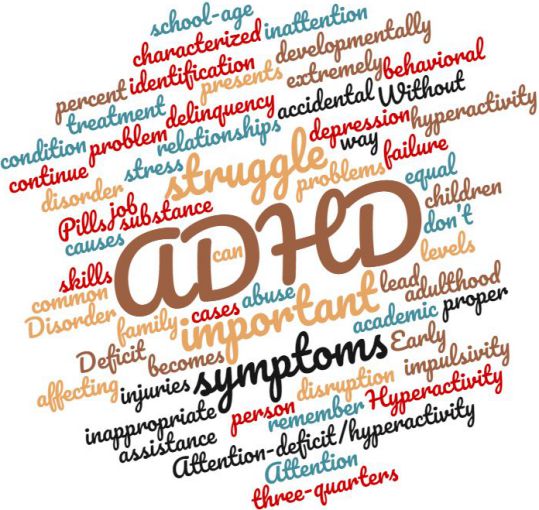44 Symptoms Of Attention Deficit Hyperactivity Disorder (ADHD)

Pills don’t equal skills. Attention-deficit/hyperactivity disorder (ADHD is characterized by developmentally inappropriate levels of inattention, impulsivity and hyperactivity.
ADHD is a common behavioral condition affecting 11 percent of school-age children. Without the proper assistance, symptoms continue into adulthood in more than three-quarters of cases.
These symptoms can lead to academic struggle, family stress and disruption, depression, problems with relationships, substance abuse, delinquency, accidental injuries and job failure.
Early identification and treatment are extremely important. It is important to remember that not all ADHD presents in the same way and only becomes a problem if it causes a person to struggle.
Below are 44 warning signs of Attention Deficit Disorder. However, it's important to remember that it’s the clustering of symptoms, the intensity, and the persistence of symptoms that create indicators of concern:
- Fidgety, restless, etc
- Can’t sit still, feels restless
- Can have boundless energy or lethargic, slow moving, sloth like
- Daydreams
- Frequent and significant mood swings
- Feels emotions intensely
- Low tolerance for frustration
- May have rage attacks
- Attention difficulties
- Trouble deciding what to pay attention to what’s most important
- Trouble initiating a task
- Often feels overwhelmed
- Trouble doing homework independently
- Trouble shifting attention to a new task
- Often hyperfocuses — on TV or video games
- Highly distractible: distracted by any change in the environment any noise, movement, or smell; also distracted by his/her own thoughts, daydreamer
- Starts many projects, but rarely finishes them
- Impulsive
- Can’t wait to be called on blurts out answers in class
- Extremely impatient, difficulty waiting for his/her turn
- Often acts before thinking doesn’t seem to learn from mistakes
- Doesn’t listen well
- Confused by multi-step oral directions
- No tolerance for boredom
- May start an argument if things are too calm
- Poor time management
- Always rushing; can’t slow down
- Makes careless mistakes
- Doesn’t use class time well, feels rushed by teachers and parents
- Puts things off until the last minute
- Odd sleep cycles: night owl, hates to go to bed
- Difficult to wake up in the morning
- May be a restless sleeper
- Bedwetting or sleepwalking
- Inconsistent performance
- Good days and bad days, some days they can do the schoolwork other days they can’t
- Disorganized, messy room, desk, backpack
- Constantly loses or misplaces things
Other Symptoms:
- Chatterbox, talks excessively interrupts conversations frequently
- Strong sense of justice, bossy
- Lots of allergies
- Terrible penmanship
- Difficulty remembering daily routines
- Relatives with ADD or ADHD
IF YOU RECOGNIZE ANY OF THESE SIGNS AND SYMPTOMS, BOOK A 10 MINUTE CALL
If you've seen or suspect any number of these signs and symptoms in your child's behaviour, we urge you to schedule a complimentary 10 minute phone call with Kyra Minichan, The Cognitive Emporium founder and developer of our unique P.A.T.H. assessment and treatment approach.
Together we will take the first steps on a P.A.T.H. to discover your child's unique superpowers.
Is ADHD Coaching Right for You or Your Child?
By Cindy Goldrich, ADHD Coach and Parenting Specialist
We hear a lot about coaching these days. While this term was reserved in the past for sports, we now have coaches for just about every profession and activity in life. So what exactly is a coach, and how does it differ from a teacher or a therapist?
Having ADHD is a complex, multifaceted condition that we are still learning about through science, research and experience. We know that it is not a lack intelligence that creates the challenge, rather the ability to harness the mind to direct it to perform when, where, and how the individual would like it to.
When you want to be successful at something – be it a sport, a profession, conquering a health challenge, improving your personal relationships, or parenting your children, often change in your knowledge and approach is necessary.
While teachers can provide you with knowledge, not every situation lends itself to the structure and curriculum that suits your needs. And therapy, while tremendously valuable in helping your sort through how you may have arrived at a certain point in life and how you may want to make changes in yourself or your situation, some circumstances are not about addressing a troubled personal past, rather creating an opportunity to design a better future.
Succeeding often means working at what you are unfamiliar with or are not good at. Most people have a hard time doing this, either because of lack of confidence, lack of skill, or a combination of both. The coach is able to help people stay attached to their purpose, gather resources, and maintain momentum.
Coaching, when you allow it, is a safe way to expose yourself to receiving observations and feedback about yourself in action. A coach can observe you and help you methodically reflect on how you are doing – what is working and what is not.
Coaches provide you a mirror, and help you put the picture in focus. The play back what you say and help you clarify the meaning so it matches your heart. They help you learn how to think, and to trust in your thoughts. They don’t tell you what to do; yet they help you see what you want to do.
Coaches are not teachers, but they teach. Coaches are not your boss, but they can be gently bossy. Coaches help you edit – your thoughts, your actions, your goals – to shape them into masterpieces. Coaches are a unique blend of motivator, educator, manager and partner.
Parenting a child who has ADHD is more complex than typical parenting. It takes more forethought, patience, strategy, time and effort. Being a person with ADHD requires no less! Support and education in the form of Coaching can make the difference between constant struggle and doubt and a positive state of hope, growth, and success.
Written by Cindy Goldrich, Ed.M., ACAC © 2013 PTS Coaching. All rights reserved. This article originally appeared in Dr. Hallowell’s Blog, February 10, 2014

